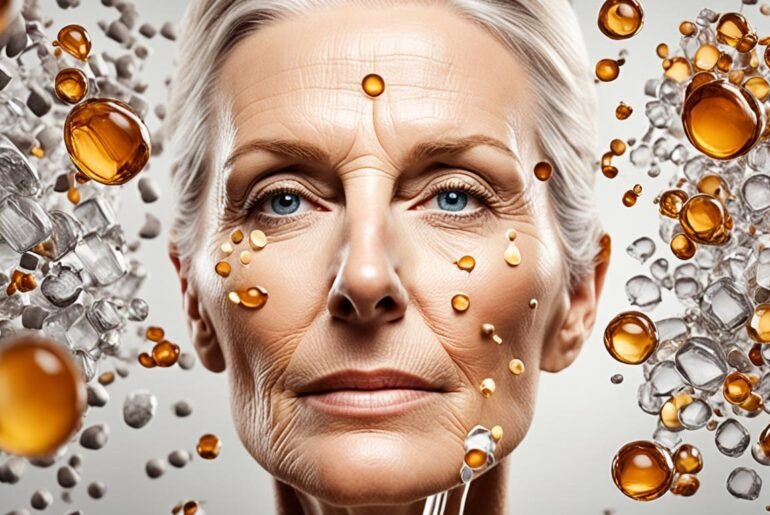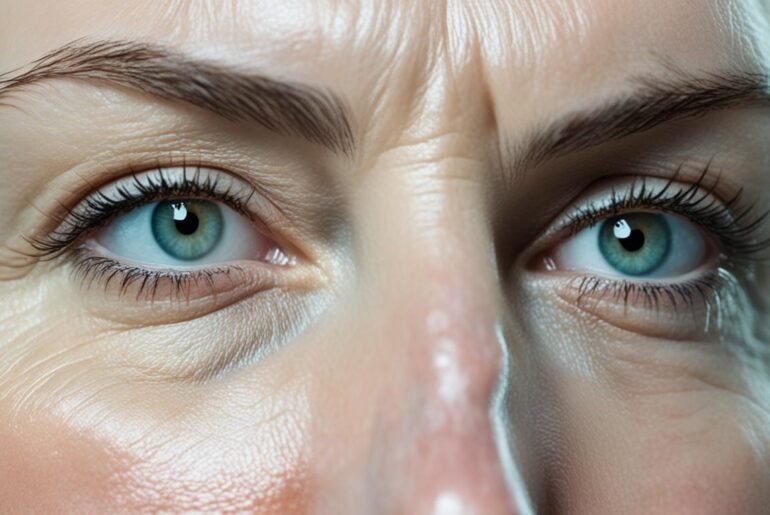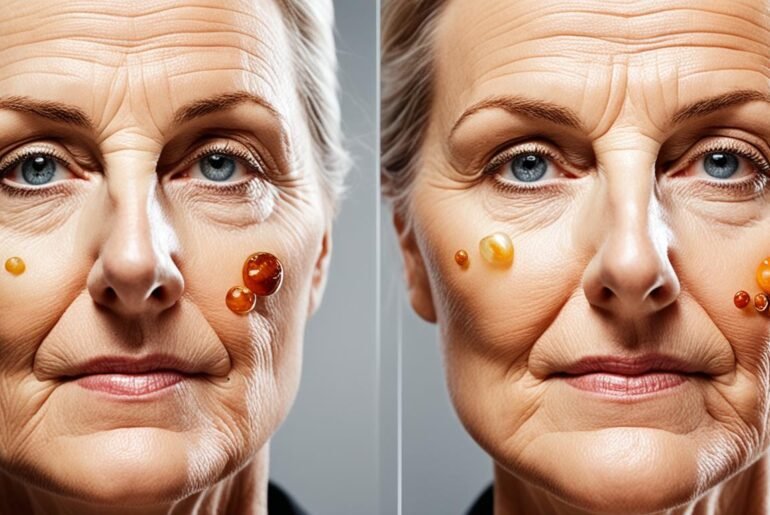Did you know that excessive alcohol consumption can lead to a degradation of skin health, causing various skin conditions? Studies have found higher rates of alcohol use disorder (AUD) among patients with skin conditions like psoriasis, eczema, and lupus. Alcohol weakens the immune system, dehydrates the skin, and impairs its ability to regenerate, resulting in wrinkles, dullness, and other skin concerns.
When it comes to our skin, we often focus on external factors like sun exposure and pollution, but the impact of alcohol on our skin is often overlooked. Heavy drinkers may experience extremely dehydrated, inflamed skin, signs of premature aging, weakened skin barrier, facial redness, and worsened acne. Understanding how alcohol affects our skin’s natural barrier is essential for maintaining healthy and radiant skin.
Key Takeaways:
- Excessive alcohol consumption can lead to various skin conditions and damage.
- Alcohol weakens the immune system, dehydrates the skin, and impairs its ability to regenerate.
- Heavy drinkers may experience inflamed and prematurely aged skin, weakened skin barrier, facial redness, and worsened acne.
- Understanding the effects of alcohol on the skin’s natural barrier is crucial for maintaining healthy skin.
- Limiting alcohol consumption or quitting altogether is recommended to protect the skin’s natural barrier and overall skin health.
Understanding the Dehydrating Effects of Alcohol on the Skin
https://www.youtube.com/watch?v=wcj8jWt1HNI
Ethanol, the main ingredient in alcohol, acts as a natural diuretic. This diuretic effect can disrupt the skin’s barrier function, leading to dehydration. When consumed in excess, alcohol increases urine output, reducing overall hydration levels throughout the body, including the skin. Additionally, alcohol induces inflammation, causing blood vessels to widen and further depriving the skin of water.
Inflammation triggered by alcohol prompts the release of pro-inflammatory cytokines, which can lead to swelling and push water out of the skin cells. Consequently, the skin loses its moisture and becomes dehydrated. Moreover, alcohol also disrupts the stratum corneum, the outermost layer of the skin that acts as a protective barrier.
This disruption weakens the tight junctions between skin cells, resulting in water loss and further exacerbating skin dehydration. The combined effects of alcohol’s diuretic properties, inflammation, and disruption of the skin’s barrier contribute to alcohol-induced skin dehydration.
The Impact of Alcohol on Skin Hydration
“Alcohol can impair the skin’s ability to retain moisture, leading to skin dehydration. When alcohol is consumed, it acts as a diuretic, increasing urine output and reducing overall hydration levels in the body, including the skin. Alcohol also induces inflammation, widening blood vessels and further depriving the skin of water. As a result, the skin loses its moisture and becomes dehydrated. Moreover, alcohol disrupts the stratum corneum, the outermost skin barrier, and loosens the tight junctions between skin cells, causing water loss. Therefore, understanding the dehydrating effects of alcohol on the skin is essential for maintaining healthy, hydrated skin.”
The Impact of Alcohol-Induced Inflammation on the Skin
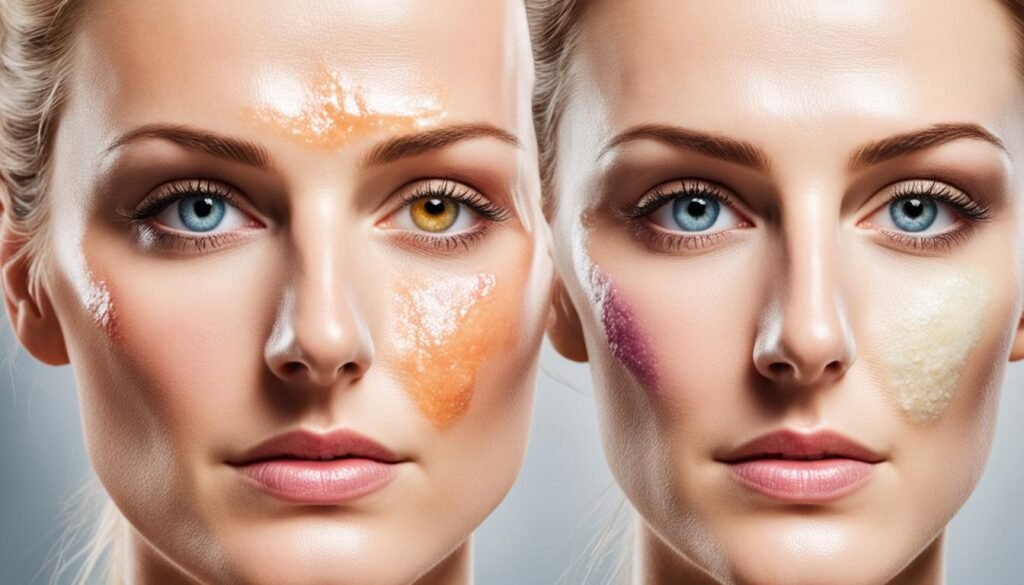
Alcohol consumption can have profound effects on the body, including the skin. One significant consequence of alcohol intake is inflammation, which can lead to various skin concerns and discomfort. Alcohol-induced inflammation often manifests as skin redness, swelling, and flushing, particularly noticeable on the nose and cheeks.
Inflammation in the skin occurs when alcohol triggers the release of pro-inflammatory cytokines. These molecules contribute to the breakdown of collagen, a key protein responsible for maintaining the skin’s strength and elasticity. As collagen degrades, the skin becomes more vulnerable to premature wrinkles and lines, resulting in a visibly aged appearance.
Moreover, alcohol-related oxidative stress can further aggravate skin inflammation. Oxidative stress refers to an imbalance between antioxidants and harmful reactive oxygen species (ROS). Excessive alcohol consumption can contribute to increased ROS production, leading to oxidative damage in the skin’s cells. This damage compromises the skin’s functioning and may accelerate the aging process.
Alcohol-induced inflammation can also lead to skin irritation and itching. Inflamed skin is more prone to discomfort and can worsen the existing inflammation, potentially paving the way for infections and other complications.
To visually demonstrate the impact of alcohol-induced inflammation on the skin, consider the following table:
| Effects of Alcohol-Induced Inflammation on the Skin | Description |
|---|---|
| Skin redness | Alcohol can cause visible redness on the skin, particularly on the nose and cheeks. |
| Skin swelling | Inflammation triggered by alcohol can result in skin swelling and puffiness. |
| Oxidative stress | Alcohol-induced oxidative stress can lead to damage in the skin’s cells and accelerate aging. |
| Premature wrinkles and lines | Collagen breakdown caused by inflammation can contribute to the formation of wrinkles and fine lines at an earlier age. |
| Skin irritation and itching | Inflamed skin is prone to irritation and itching, exacerbating the existing inflammation and potentially leading to other complications. |
Note: The information in the table provides a visual representation of the effects of alcohol-induced inflammation on the skin.
It is essential to be aware of the impact of alcohol-induced inflammation on the skin and take steps to mitigate its effects. Limiting alcohol consumption or avoiding excessive drinking can help protect the skin from inflammation-related damage. Additionally, implementing a comprehensive skincare routine, including antioxidant-rich products and moisturizers, can support the skin’s health and minimize the signs of inflammation.
The Importance of Antioxidants in Skincare
Incorporating antioxidants into a skincare routine can help counteract the effects of alcohol-induced inflammation. Antioxidants combat oxidative stress and neutralize harmful free radicals, reducing the damage caused to the skin’s cells. Look for skincare products containing ingredients like vitamin C, vitamin E, green tea extract, or niacinamide, which possess potent antioxidant properties.
The soothing and anti-inflammatory properties of antioxidants can also help alleviate redness, swelling, and irritation associated with alcohol-induced inflammation. Using products that include antioxidants can aid in calming the skin and promoting a healthier complexion.
The Effect of Alcohol on Skin Aging
As part of the natural aging process, skin loses collagen, elasticity, and firmness. Alcohol accelerates this process by dehydrating the skin, triggering inflammation, and breaking down collagen. Heavy alcohol consumption can lead to more noticeable lines on the forehead, puffy and swollen eyes, prominent mouth lines, lost volume in the midface, visible blood vessels on the face, and overall dull and aged-looking skin. To maintain youthful and healthy skin, limiting alcohol consumption or quitting altogether is recommended.
| Effects of Alcohol on Skin Aging | Signs of Alcohol-Induced Aging |
|---|---|
| Dehydration of the Skin | Noticeable lines on the forehead |
| Inflammation | Puffy and swollen eyes |
| Collagen Breakdown | Prominent mouth lines |
| Loss of Elasticity | Lost volume in the midface |
| Weakened Blood Vessels | Visible blood vessels on the face |
| Dull and Aged-Looking Skin | Overall aged appearance |
Alcohol’s Disruption of the Skin’s Natural Barrier
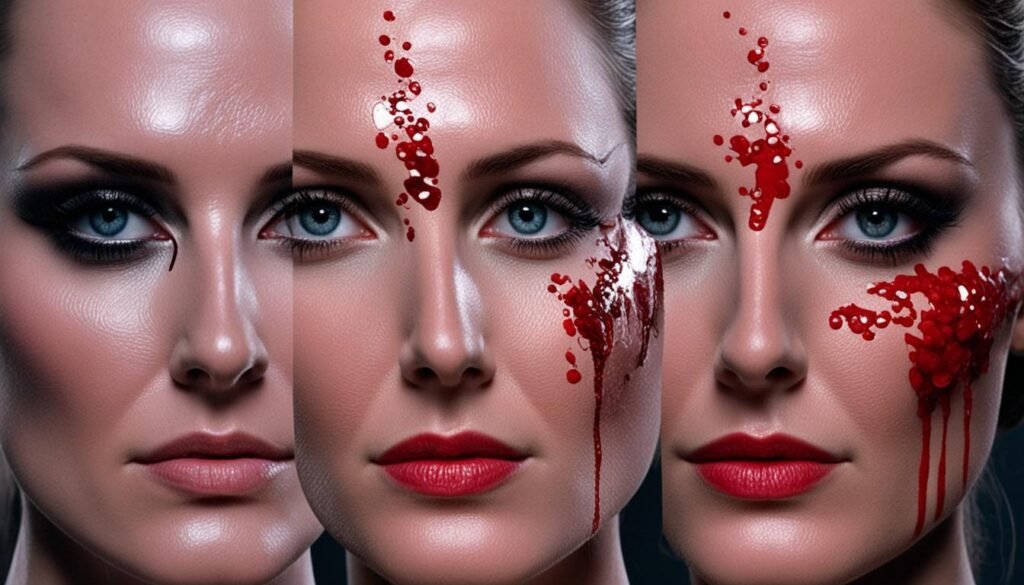
The skin’s outermost layer, the stratum corneum, acts as a protective barrier, controlling what enters and stays out of the skin. Excessive alcohol consumption disrupts this delicate balance, weakening the skin’s defenses.
Alcohol loosens the tight junctions between skin cells, allowing water to escape and allergens and toxins to enter more easily. It also strips away natural oils that reinforce the barrier. This disruption can lead to skin irritation, inflammation, and damage both internally and on the surface.
Alcohol’s Impact on Skin Barrier Function
The effects of alcohol on skin barrier function are significant. Alcohol-induced skin damage weakens the integrity of the barrier, making it more susceptible to external pollutants and irritants. This can result in various skin concerns, including redness, dryness, and sensitivity.
Moreover, alcohol acts as a skin penetration enhancer, increasing the permeability of the skin. This means that not only can harmful substances enter more easily, but also ingredients from skincare products can penetrate deeper, potentially causing further damage or irritation.
“Excessive alcohol consumption disrupts the skin’s natural barrier, making it more vulnerable to environmental stressors and accelerating skin aging.” – Dermatologist Dr. Emily Collins
Protecting the Skin’s Barrier from Alcohol Damage
While it may be challenging to avoid alcohol completely, there are steps you can take to minimize its impact on your skin’s natural barrier:
- Limit alcohol consumption and opt for moderation.
- Follow a skincare routine that includes gentle cleansers and moisturizers to replenish lost moisture.
- Choose alcohol-free or low-alcohol skincare products to reduce the risk of further barrier disruption.
- Avoid using alcohol-based toners or astringents that can exacerbate dryness and irritation.
By prioritizing the health and integrity of your skin’s barrier, you can mitigate the damaging effects of alcohol and maintain a healthy complexion.
The Controversy Surrounding Alcohol in Skin Care Products
Alcohol is a commonly used ingredient in a variety of skin care products, including makeup, lotions, fragrance, and hair products. It is known for providing a lighter texture and improving the overall feel of the product. However, the use of alcohol in skin care has sparked a controversy among experts and consumers alike.
Some argue that alcohol can have negative effects on the skin, such as drying it out and making it more prone to irritation. They believe that prolonged use of alcohol in skin care products can disrupt the skin’s natural moisture balance and compromise its barrier function. This can lead to increased sensitivity, redness, and dryness.
“Alcohol, despite being a common ingredient, can disrupt the skin’s moisture balance and compromise its natural barrier function.”
On the other hand, proponents of alcohol in skin care argue that it can enhance ingredient penetration into the skin and serve as a preservative, prolonging the shelf life of products. They believe that alcohol can help other beneficial ingredients penetrate deeper into the skin, thereby maximizing their effectiveness.
The safety of alcohol in skin care products largely depends on various factors, including the individual’s skin type, the concentration of alcohol used, and the presence of other irritants or allergens in the product. It is important for individuals to understand their skin’s specific needs and sensitivities when deciding whether to include alcohol-based products in their skincare routine.
Benefits and Drawbacks of Alcohol in Skin Care
Benefits:
- Enhanced ingredient penetration
- Improved product texture and feel
- Prolonged shelf life
Drawbacks:
- Potential skin dehydration and dryness
- Increased skin sensitivity and irritation
- Compromised skin barrier function
To make an informed decision about using alcohol-based skin care products, individuals should consider their own skin’s needs, consult with skincare professionals, and carefully read ingredient labels.
It’s important to note that there are alcohol-free alternatives available in the market for those who prefer to avoid alcohol in their skincare routine. These products are formulated without alcohol and often offer similar benefits without the potential drawbacks. By opting for alcohol-free skincare options, individuals can maintain the health and integrity of their skin while still enjoying the benefits of effective skincare.
Finding Alcohol-Free Skin Care Products
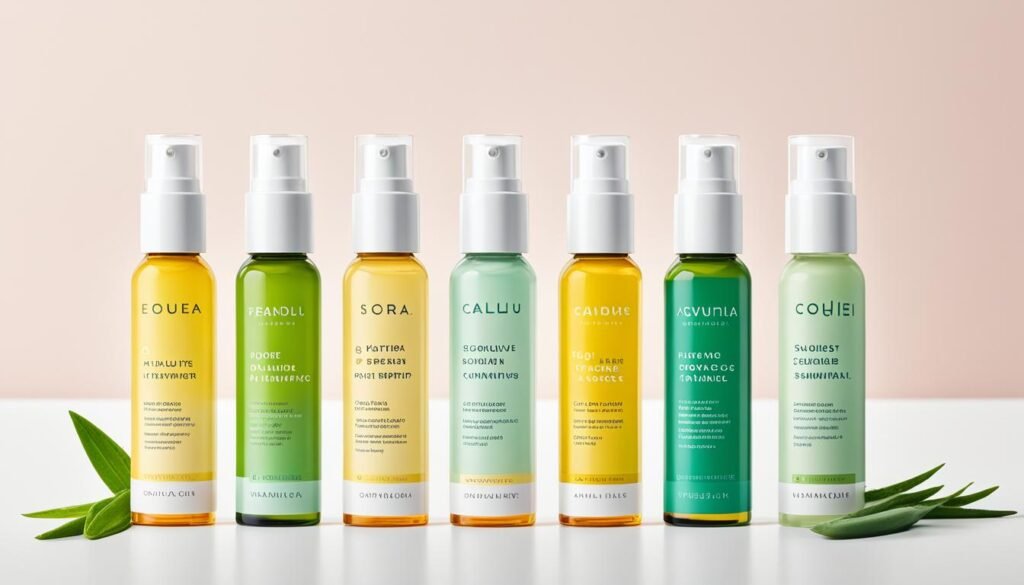
If you’re looking to avoid alcohol in your skin care routine, there are plenty of alcohol-free options available. Many brands label their products as “alcohol-free” to cater to consumers seeking alternatives to alcohol-based formulations. However, it’s important to note that when a product is labeled “alcohol-free,” it specifically refers to ethyl alcohol, also known as ethanol. Fatty alcohols, such as cetyl and stearyl alcohol, have different properties and can actually provide moisturizing benefits to the skin.
When searching for alcohol-free skin care products, it’s advisable to carefully read the ingredient labels. Look for products that explicitly state “alcohol-free” and do not contain ethyl alcohol. Additionally, keep an eye out for fatty alcohols, which are often found in moisturizers, cleansers, and hair products. These fatty alcohols can enhance the texture and feel of the product while providing moisturizing benefits.
Working with a dermatologist can also be beneficial in finding suitable alcohol-free skin care options. They can assess your skin type and recommend specific products that align with your skincare needs.
Remember, not all alcohols in skin care are bad. Fatty alcohols can actually be beneficial for the skin. It’s all about understanding the different types and their effects.
Choosing alcohol-free skin care products offers several benefits. Firstly, these products are less likely to cause dryness or irritation, making them suitable for individuals with sensitive skin or skin conditions. Alcohol can strip the skin of its natural oils, leading to dryness and potential skin barrier disruption. By using alcohol-free skincare options, you can help maintain the skin’s moisture balance and overall health.
Furthermore, eliminating alcohol from your skin care routine can minimize the risk of experiencing adverse reactions, such as redness, itching, or inflammation. Some individuals may be more sensitive to the effects of alcohol on the skin, and avoiding it altogether can help prevent these issues.
By opting for alcohol-free products, you have the opportunity to nourish and protect your skin without the potential drawbacks associated with alcohol-based formulations. So, if you’re looking to avoid alcohol in your skincare routine, be mindful of product labels, read ingredient lists, and consider the advice of a dermatologist to find the right alcohol-free options for your skin’s unique needs.
| Benefits of Alcohol-Free Skin Care Products | Alternatives to Alcohol in Skin Care |
|---|---|
|
|
The Impact of Alcohol on Skin Penetration
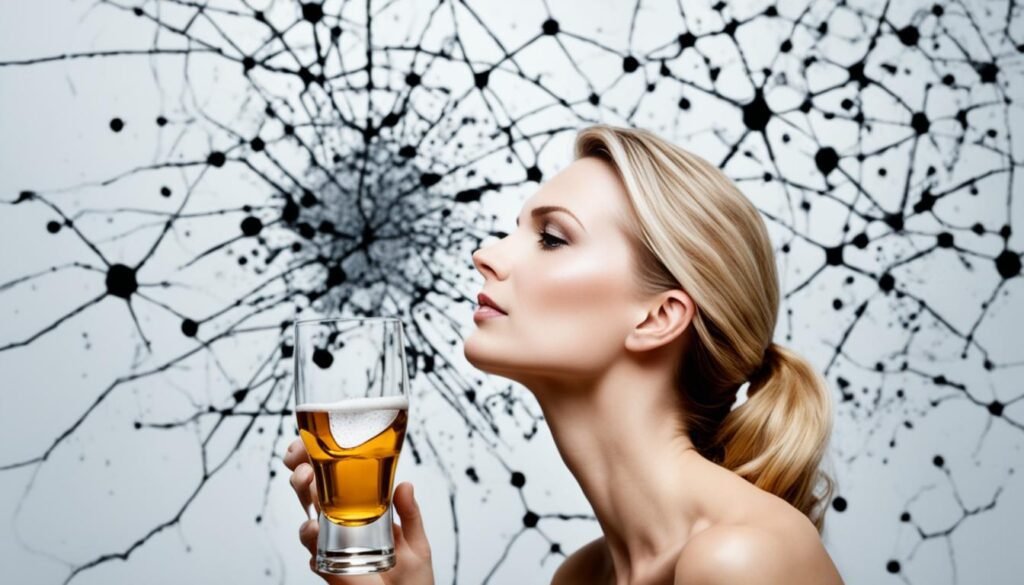
Alcohol, when topically applied, can play a significant role as a skin penetration enhancer, enhancing the absorption of other ingredients into the skin. This attribute of alcohol has important implications for the safety and efficacy of cosmetic formulations.
When alcohol is applied to the skin, it can potentially increase the skin’s exposure to xenobiotics, which are foreign substances like harmful contaminants that can penetrate the skin. This increased permeability can allow for the absorption of both beneficial and potentially harmful substances, depending on the ingredients present.
However, it is important to note that the exact mechanisms and long-term effects of alcohol as a skin penetration enhancer are still not fully understood. Further research is needed to explore the extent of alcohol’s role in enhancing ingredient absorption and the potential consequences it may have on transdermal absorption.
Research in this area is crucial for determining the safety and appropriate usage of alcohol in skincare products. Understanding the effects of alcohol on transdermal absorption can help inform the development of formulations that minimize risks and maximize benefits for consumers.
As the skincare industry continues to evolve, it is essential for manufacturers, regulators, and researchers to work together to establish evidence-based guidelines and standards concerning alcohol’s impact on skin penetration. This collaborative effort will contribute to the development of safer and more effective skincare products.
Comparison of Skin Penetration Enhancers
| Skin Penetration Enhancer | Properties | Examples |
|---|---|---|
| Alcohol | Enhances absorption of other ingredients | Isopropyl alcohol, ethanol |
| Oleic Acid | Increases permeability of the stratum corneum | Olive oil |
| Dimethyl Sulfoxide (DMSO) | Penetrates the skin and acts as a carrier | Medical-grade DMSO |
The table above provides a comparison of skin penetration enhancers commonly used in skincare formulations. While alcohol is widely used for its penetration-enhancing properties, oleic acid and dimethyl sulfoxide (DMSO) are also relevant ingredients in this context.
It is important for skincare consumers to be aware of the ingredients present in their products and to consult with dermatologists or skincare professionals for personalized recommendations based on their skin type and concerns.
The Risk Assessment of Topical Ethanol Applications
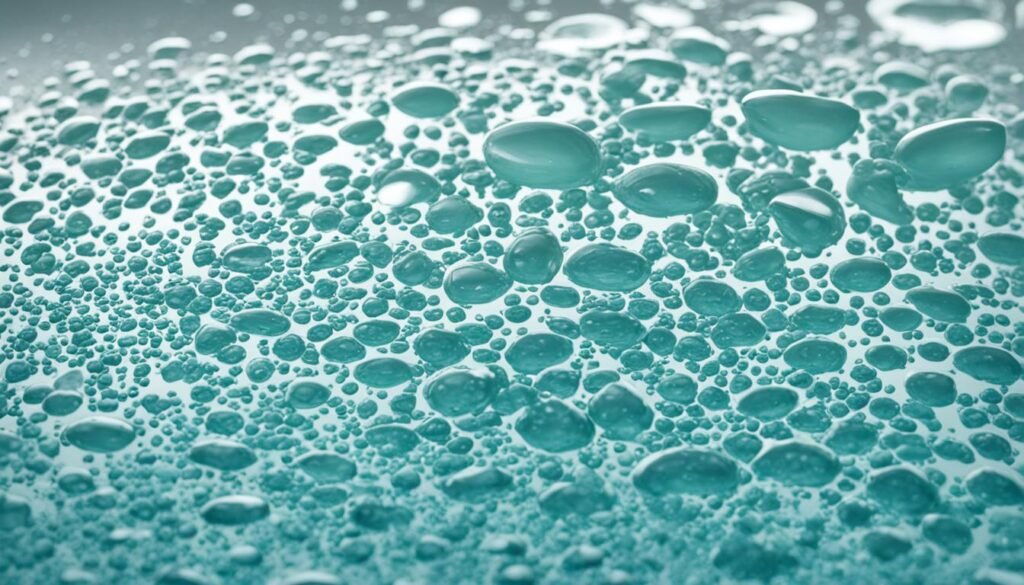
The safety of topical ethanol applications is still a matter of debate, and there is a need for independent studies to assess the chronic toxic effects of ethanol, especially on specific populations like children and individuals with deficiencies in ethanol metabolism. Current research suggests that while the acute toxic levels of ethanol are not reached through topical application, there may still be potential risks associated with its use.
One area of concern is the potential for skin irritation caused by topical ethanol. Ethanol is known to have a drying effect on the skin, and prolonged exposure may lead to discomfort and inflammation. This risk is particularly relevant for individuals with sensitive skin or pre-existing skin conditions.
Another consideration is the percutaneous toxicity of ethanol in children. Ethanol can be rapidly absorbed through the skin, and young children may be more susceptible to its toxic effects. The use of topical ethanol products on children should be approached with caution, and further research is needed to understand the potential long-term consequences.
“Ethanol’s impact on individuals with genetic deficiencies in ethanol metabolism requires close examination. These individuals may have a reduced ability to metabolize ethanol, leading to an increased risk of adverse effects. It is crucial to evaluate the safety of topical ethanol applications in this specific population to ensure their well-being.”
Additionally, while acute exposure to ethanol through topical applications is unlikely to reach toxic levels, the long-term effects of topical ethanol use are not well-understood. It is essential to investigate any potential cumulative or chronic toxic effects that may arise from prolonged or repeated exposure to ethanol through skincare products.
To gain a comprehensive understanding of the safety of topical ethanol applications, independent research studies are necessary. These studies should assess the chronic toxic effects of ethanol, its impact on specific populations such as children and individuals with ethanol metabolism deficiencies, and the potential long-term consequences of its use.
| Risk Factors | Considerations |
|---|---|
| Skin Irritation | Topical ethanol may cause skin dryness, discomfort, and inflammation, posing a risk to individuals with sensitive skin or existing skin conditions. |
| Percutaneous Toxicity in Children | Children may be more susceptible to the toxic effects of ethanol, requiring careful consideration when using topical ethanol products on young individuals. |
| Genetic Deficiencies in Ethanol Metabolism | Individuals with deficiencies in ethanol metabolism may be at a higher risk of adverse effects, necessitating a closer examination of the safety of topical ethanol use. |
| Long-Term Effects | Further research is needed to understand the potential cumulative or chronic toxic effects of prolonged or repeated exposure to ethanol through skincare products. |
With the completion of independent studies on risk assessment and the chronic toxic effects of topical ethanol, a clearer understanding of its safety can emerge. This is essential to ensure the well-being and informed decision-making of individuals using skincare products containing ethanol.
The Importance of Independent Studies on Topical Ethanol Applications
Due to the potential bias within the industry and the limited scientific research available, it is crucial to conduct independent studies on the effects of topical ethanol applications. These studies should focus on filling the research gaps regarding ethanol’s effects on the skin, particularly its chronic toxic effects and the long-term impact of topical ethanol use.
Ethanol, the primary ingredient in alcoholic beverages and commonly found in skincare products, has the potential to cause harm to the skin over time. However, the existing knowledge is insufficient in fully understanding the extent of its impact on the skin barrier and overall skin health.
In order to address these research gaps, it is essential to explore the chronic toxic effects of ethanol and its metabolite, acetaldehyde, on the skin. Independent studies should aim to investigate the potential risks associated with long-term topical ethanol use and its effects on specific populations, such as children and individuals with genetic deficiencies in ethanol metabolism.
These studies will provide valuable insights into the risks and safety concerns surrounding topical ethanol use in skincare, helping to guide consumers, healthcare professionals, and regulators in making informed decisions.
The Importance of Researching Chronic Toxic Effects
Current knowledge on the chronic toxic effects of ethanol on the skin is limited. While ethanol is generally recognized as safe for topical use in small quantities, its long-term impact remains uncertain. Independent studies will shed light on the potential harm caused by prolonged exposure to ethanol and its metabolites, giving researchers and the medical community a better understanding of its risks.
Further investigation is necessary to determine the threshold at which ethanol becomes toxic and explores its accumulative effects over time. This information will help establish guidelines and recommendations for the safe use of ethanol in skincare products.
Filling Research Gaps on Ethanol’s Effects on the Skin
Despite the widespread use of ethanol in skincare, there are significant gaps in our understanding of its effects on the skin. Independent studies can help bridge these gaps by exploring the mechanisms through which ethanol interacts with the skin, determining its impact on the skin’s barrier function, and elucidating potential skin conditions triggered by ethanol use.
Such research will contribute to a comprehensive understanding of ethanol’s effects on the skin and enable the development of evidence-based guidelines for its use in skincare products.
Understanding the Long-Term Impact of Topical Ethanol Use
While the acute effects of topical ethanol use may be well-established, the long-term impact requires further investigation. Independent studies should focus on evaluating the extended use of ethanol in skincare products and its potential consequences on skin health.
Researching the long-term effects of topical ethanol use will better equip individuals, skincare professionals, and manufacturers to make informed decisions regarding the formulation and application of skincare products. This knowledge will promote the development of safer and more effective products that prioritize skin health and overall well-being.
| Topic | Research Focus |
|---|---|
| Chronic Toxic Effects | Investigate the long-term consequences of topical ethanol use on the skin, including potential toxicity and risks associated with ethanol and its metabolite acetaldehyde. |
| Effects on Skin Barrier | Examine the impact of ethanol on the protective skin barrier and its role in compromising skin health and function. |
| Specific Populations | Investigate the effects of topical ethanol use on vulnerable populations, such as children and individuals with genetic deficiencies in ethanol metabolism, to understand their unique risks and sensitivities. |
By conducting independent studies on topical ethanol applications, we can gain a more comprehensive understanding of its effects on the skin, identify potential risks, and ensure the development of safer and more effective skincare products.
Conclusion
Excessive alcohol consumption can have a significant impact on the health and appearance of our skin. The effects of alcohol on the skin’s natural barrier are far-reaching and can result in various skincare concerns and damage. Drinking alcohol dehydrates the skin, causes inflammation, accelerates the aging process, weakens the skin’s protective barrier, and even enhances the absorption of potentially harmful ingredients.
In order to maintain the health and integrity of our skin, it is crucial to be mindful of our alcohol consumption. Limiting our intake or quitting alcohol altogether can help protect the skin’s natural barrier, prevent skin dehydration, and mitigate the risk of premature aging. By doing so, we can ensure our skin remains healthy, vibrant, and resilient.
Furthermore, continued research is needed to better understand the long-term effects of alcohol on the skin and to develop safer skincare products. Our understanding of alcohol’s impact on the skin’s barrier function and overall health is continuously evolving, and further studies will help shed light on the best ways to protect and care for our skin in the context of alcohol consumption.
Ultimately, being mindful of our alcohol consumption and taking proactive steps to protect our skin’s natural barrier can greatly influence our skincare outcomes and overall skin health. By exploring alternative ways to unwind and embracing a more balanced lifestyle, we can achieve beautiful, healthy skin that reflects our inner well-being.
FAQ
How does alcohol damage the skin’s natural barrier?
Excessive alcohol consumption can weaken the skin’s barrier function by dehydrating the skin, impairing its ability to regenerate, and causing inflammation that disrupts the tight junctions between skin cells.
What are the effects of alcohol on the skin?
Alcohol can lead to various skin concerns, including wrinkles, dullness, dehydration, inflammation, redness, premature aging, weakened barrier function, and worsened acne.
How can I protect my skin’s barrier from alcohol damage?
Limiting alcohol consumption or quitting altogether is recommended to maintain the health and integrity of the skin’s natural barrier. Additionally, using alcohol-free skincare products can help minimize alcohol-related damage.
How does alcohol impact skin health?
Alcohol weakens the immune system, dehydrates the skin, impairs collagen production, and accelerates the aging process, leading to various skin concerns and conditions.
Can alcohol disrupt the skin’s natural barrier?
Yes, alcohol can disrupt the skin’s natural barrier by loosening the tight junctions between skin cells, causing water loss, and allowing allergens and toxins to enter more easily.
Are there alcohol-free skincare products available?
Yes, there are alcohol-free skincare products available. It’s important to read ingredient labels and look for products specifically labeled as “alcohol-free” to avoid the potential drying and irritating effects of alcohol.
Can alcohol enhance the absorption of other skincare ingredients?
Yes, alcohol can act as a skin penetration enhancer and potentially increase the skin’s exposure to other ingredients. However, there is ongoing debate regarding its safety and efficacy in skincare formulations.
Is alcohol safe for topical use on the skin?
The safety of topical ethanol applications is still uncertain, and further independent studies are needed to assess its long-term effects, especially on specific populations such as children and individuals with deficiencies in ethanol metabolism.
Do we need more independent studies on the effects of alcohol on the skin?
Yes, there is a need for more independent studies to fully understand the chronic toxic effects of alcohol, including its metabolite acetaldehyde, on the skin, as well as its impact on specific populations and long-term use.
What is the overall impact of alcohol on the skin?
Excessive alcohol consumption can have detrimental effects on the skin’s natural barrier, leading to dehydration, inflammation, accelerated aging, and increased vulnerability to skin conditions. Limiting alcohol intake and using alcohol-free skincare products are recommended for healthier skin.


